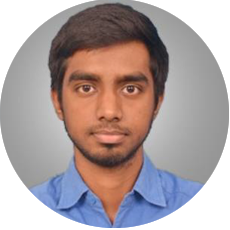
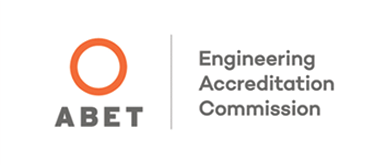
To be a renowned Centre of Excellence in Education and Research in the field of Electrical and Electronics Engineering.


To produce technically competent Electrical and Electronics engineering graduates through quality education to meet the challenges of their chosen professional career.
To provide opportunities and resources so that students imbibe research acumen to innovate, leading to start ups later to cater to societal needs.
To inculcate social responsibility, ethical values and outlook for sustainable development among students.
Established in 1992, the department is synonymous with excellence for its B.Tech in Electrical and Electronics Engineering, M.Tech in Renewable Energy Technologies and a full fledged PhD program. The department has undertaken major research projects funded by DST, IE(I) and IEEE and known for having established collaboration with leading industries and reputed education institutions to undertake joint research projects. Maintaining the level of excellence, we are now establishing a Smart Grid laboratory under DST-FIST (Level-1) scheme. The department has always proved its metal in academics and is accredited by the National Board of Accreditation (NBA) under Tier-I category. The B.Tech (Electrical and Electronics Engineering) programme also got accredited by ABET. The curriculum of the B.Tech. Electrical and Electronics Engineering (EEE) programme is intended to strike a balance between the scope of knowledge gained through specialisation and the breadth of knowledge gained through exploration. The programme offers a thorough grounding in the core topics of EEE, as well as a specialisation specific to emerging engineering and technological challenges.The programme is designed to develop trained electrical and computer engineers capable of working in core electrical engineering, information and communication systems, and other related fields.
Academics
To teach students about this specialised field, the Department of Electrical & Electronic Engineering employs experienced and well-trained staff. The faculty members have published more than 500 research articles in the area of power system security, power system optimization, voltage stability, Power quality, reactive power compensation, Generation expansion planning, renewable energy system in well reputed journals. The department has established collaboration with leading industries (National Instruments, ABB, TNEB, TVS, and Intel) and reputed education institutions to undertake joint research activities. The department also collaborated with many organisations such as: MITSUBA SICAL, JBM AUTO, KALYCITO, PERFECT ELECTRONICS, SWIFTERZ, etc. to offer internship & placement opportunities to the students. It also encourages students to participate in co-curricular and extracurricular activities to ensure an all round development. Many consultancy projects have been performed to meet the needs of the electrical industries. Students are placed in leading core industries and are also enrolled in an internationally recognised research institution. Short term courses are offered to the students to enhance the employability skill on Matlab, Embedded processor and LaTeX. Students are given exposure to current trends including embedded controller design, neural networks, Genetic algorithm etc through seminars, and guest lectures by the field experts. The students are given hands-on training on PLC, SCADA-RTU, Energy Conservation and Electromagnetic Transient simulation through short term courses and workshops. Non-CGPA courses are offered to improve the performance of the students in the extracurricular and co-curricular activities.
The Institute of Electrical and Electronics Engineers (IEEE) and The Institution of Engineers (India) have active student chapters in the department (IEI). The students of B.Tech-Electrical & Electronics Engineering programme are offered One credit course by the Industry and International Professors. The department frequently organises international and national conferences, seminars, faculty development programmes, workshops, and short-term training programmes for faculty, research scholars, and students that are funded by funding agencies such as CSIR, DRDO, IE(I), ISTE, and IEEE in order to enhance their knowledge.

DC & AC Machines Laboratory
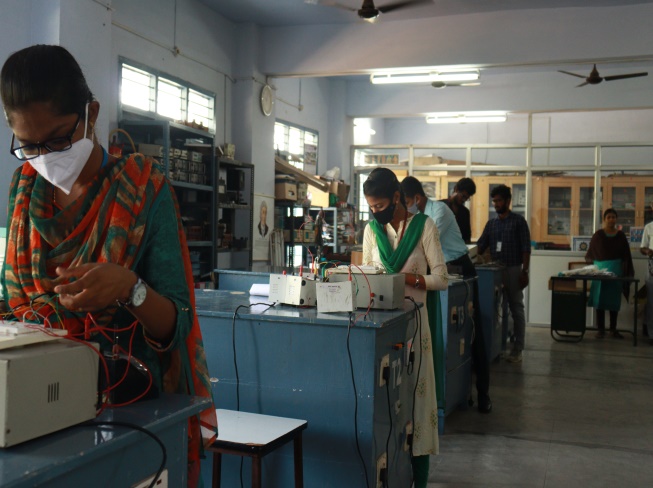
Applied Electronics
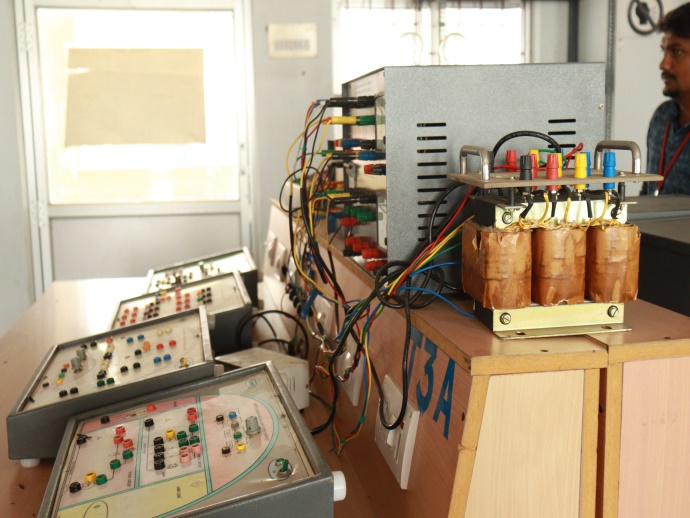
Power Electronics
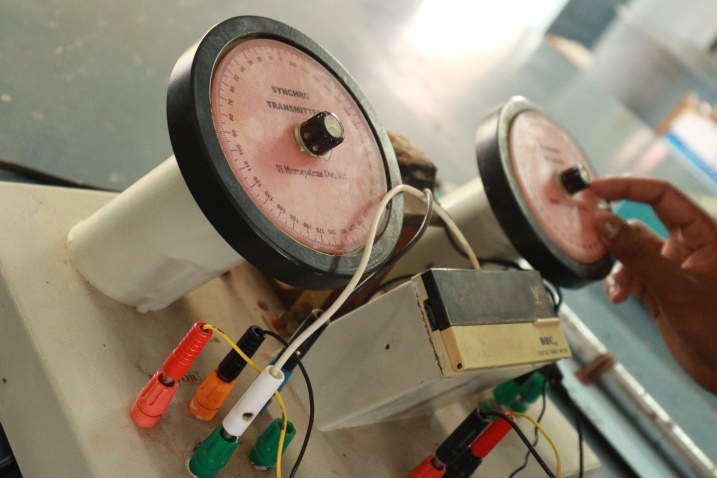
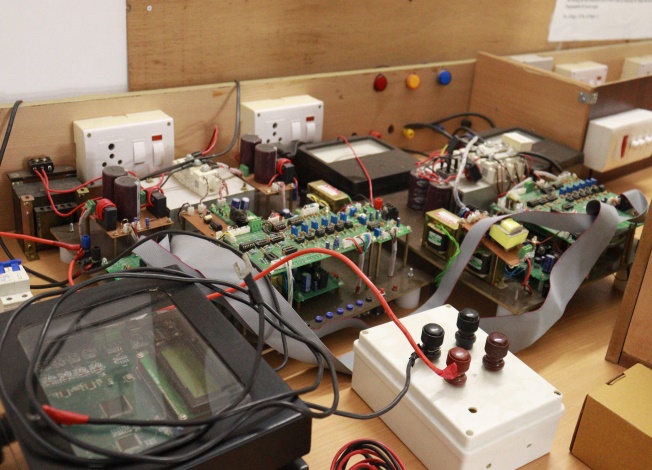
Renewable energy laboratory
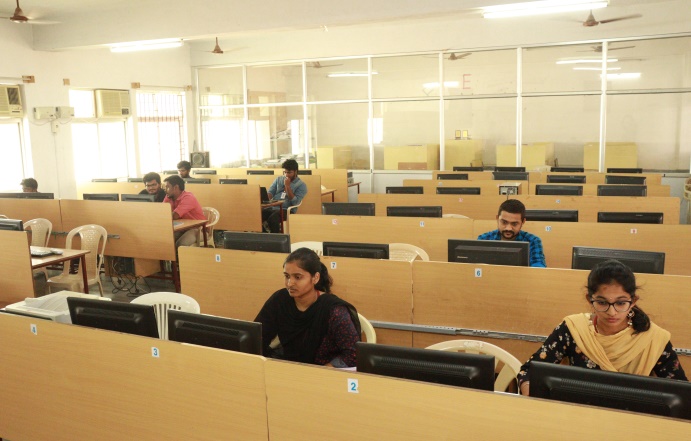
Power system simulation Laboratory
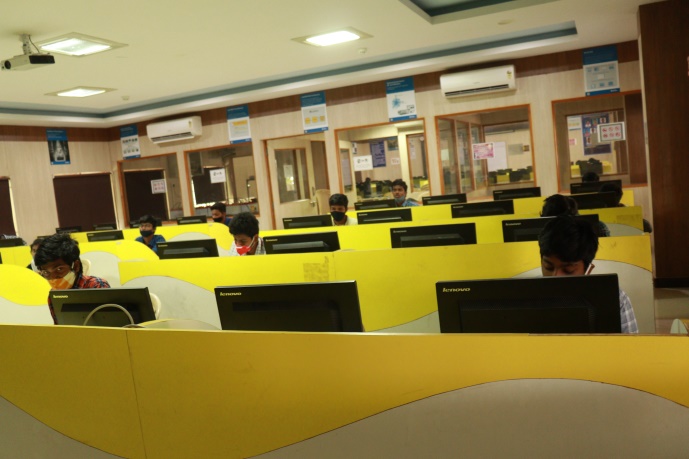
Intel Intelligence Systems Laboratory
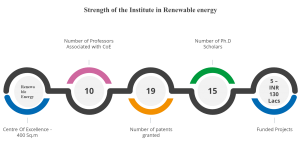
PSO1 – Engineering Knowledge: Apply the knowledge of Mathematics, Science, Engineering fundamentals and Electrical and Electronics Engineering to the solution of complex problems in engineering
PSO2 – Problem analysis: Identify, formulate and analyze the complex problems in Electrical and Electronics Engineering using first principles of mathematics, science and Engineering to derive conclusions.
PSO3 – Design/development of solutions: Design and development of Electrical and Electronics products/Systems that meets specified needs with the consideration for the public health and safety, cultural, societal and environmental issues
PSO4 – Conduct investigations of complex problems: Analysis of complex problems in electrical apparatus and energy systems using research based knowledge and research methods to provide valid solutions.
PSO5 – Modern Tool Usage: Apply appropriate tools and techniques for the modelling and analysis of Electrical and Electronics devices and systems.
PSO6 – The Engineer and Society: Apply Knowledge gained to assess societal, safety and cultural issues relevant to the professional engineering practice.
PSO7 – Environment and Sustainability: Understand the impact of solutions in electrical engineering field in societal and environmental contexts and demonstrate the importance of sustainable development
PSO8 – Ethics: Apply ethical principles and professional responsibilities in electrical and electronics engineering practice.
PSO9 – Individual and Team Work: Ability to function as an individual and as a member or leader in diverse teams in the multidisciplinary environment.
PSO10 – Communication: Ability to communicate effectively with the engineering community and society on complex engineering activities.
PSO11 – Project Management and Finance: Ability to apply the knowledge of engineering and management principles to implant the projects in multidisciplinary environment.
PSO12 – Life-long learning: Ability to recognize the need for and engage in life-long learning.
PSO13– Analysis & Solution of complex problems in Electrical & Electronics Engineering using modern tools.
PSO14– Design and Development of Electrical & Electronics products /systems that meets specified needs.
PSO15– Understand and demonstrate the importance of sustainable energy development.
PEO1: Pursue higher studies leading to a career in research or be employed in Electrical and Electronics Engineering and allied disciplines.
PEO2: Be successful startupreneurs related to Electrical and Electronics engineering or allied engineering fields.
PEO3: Promote ethics, sustainability and environmental responsibility in their practice.
ASO1 – An ability to identify, formulate, and solves complex engineering problems by applying principles of engineering, science, and mathematics.
ASO2 – An ability to apply engineering design to produce solutions that meet specified needs with consideration of public health, safety, and welfare, as well as global, cultural, social, environmental, and economic factors.
ASO3 – An ability to communicate effectively with a range of audiences.
ASO4 – An ability to recognize ethical and professional responsibilities in engineering situations and make informed judgments, which must consider the impact of engineering solutions in global, economic, environmental, and societal contexts.
ASO5 – An ability to function effectively on a team whose members together provide leadership, create a collaborative and inclusive environment, establish goals, plan tasks, and meet objectives.
ASO6 – An ability to develop and conduct appropriate experimentation, analyze and interpret data, and use engineering judgment to draw conclusions.
ASO7 – An ability to acquire and apply new knowledge as needed, using appropriate learning strategies.
Research and Development is the backbone of the department. The initial seeds of research were sown in the year 2002 when the power system automation laboratories was established with the support of ABB Ltd, Bangalore. The department reached a further fillip in research activities, when anna university, chennai has organized the department as one of the approved research centers in the year 2004. There are four research laboratories with the state of the art facilities to carry out research. The major research focus of the department are power systems, power electronics, renewable energy and intelligent systems. The department has made collaboration with industries and leading academic institutions to carry out collaborative research work.
The department has contributed significantly on the research front and it is highlighted here.



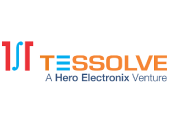


























• Christus Pravin, Praveen Shai, Jawahar Akash, Shubham Raj are selected for the project presentation in IEEE YESIST 12 at Stamford International University, Thailand on 7-8, Sep. 2019.
Jawahar Akash A and Shubham Raj presented the project on “PRPA Intelligent bike system” in IEEE SS12 Project Competition at NSBM Green University, Sri Lanka on 8-9th Sep. 2018
.
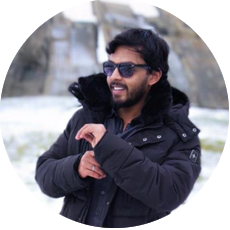
I have started my career of High-Level learning in Kalasalingam University. The very First day I was afraid of all which is going to happen in next few years. Everyone says Electrical and Electronics Engineering is the toughest High-Level learning, and I was floating like an ant in Pan full of discourage, Disappointment and Negative comments. But the environment created by the faculties of my department, friends and the management shown me the Light from the darkness. They trained me, not only me but every one of us to face the Real world.
CHRISTUS PRAVIN AMBROSE (2016-20)
